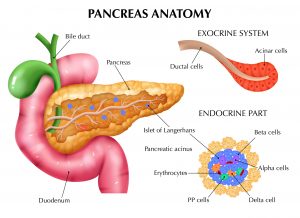Featured Products
- In-Stock Tumor Cell Lines
- Human Orbital Fibroblasts
- Human Microglia
- Human Pulmonary Alveolar Epithelial Cells
- Human Colonic Fibroblasts
- Human Type II Alveolar Epithelial Cells
- Human Valvular Interstitial Cells
- Human Thyroid Epithelial Cells
- C57BL/6 Mouse Dermal Fibroblasts
- Human Alveolar Macrophages
- Human Dermal Fibroblasts, Adult
- Human Lung Fibroblasts, Adult
- Human Retinal Muller Cells
- Human Articular Chondrocytes
- Human Retinal Pigment Epithelial Cells
- Human Pancreatic Islets of Langerhans Cells
- Human Kidney Podocyte Cells
- Human Renal Proximal Tubule Cells
Primary Cells
Explore Products



 Human Pancreatic Epithelial Cells are primary epithelial cells isolated from healthy adult human pancreatic tissue using enzymatic dissociation and selective adherence techniques. These cells are derived from the exocrine portion of the pancreas and are non-tumorigenic and non-metastatic, making them ideal for in vitro modeling of pancreatic physiology. They display polygonal morphology and grow as adherent monolayers under standard culture conditions. During development, the pancreatic epithelial network differentiates into acinar, ductal, and endocrine cell types, with endocrine progenitors emerging via delamination to form islets of Langerhans. These cells express cytokeratin-19 (CK19), a marker of ductal epithelium, and typically do not express insulin or glucagon, distinguishing them from endocrine cells. Their passage number is generally low to preserve primary characteristics. They are a valuable tool for studying pancreatic development, tissue engineering, and diabetes-related research.
Human Pancreatic Epithelial Cells are primary epithelial cells isolated from healthy adult human pancreatic tissue using enzymatic dissociation and selective adherence techniques. These cells are derived from the exocrine portion of the pancreas and are non-tumorigenic and non-metastatic, making them ideal for in vitro modeling of pancreatic physiology. They display polygonal morphology and grow as adherent monolayers under standard culture conditions. During development, the pancreatic epithelial network differentiates into acinar, ductal, and endocrine cell types, with endocrine progenitors emerging via delamination to form islets of Langerhans. These cells express cytokeratin-19 (CK19), a marker of ductal epithelium, and typically do not express insulin or glucagon, distinguishing them from endocrine cells. Their passage number is generally low to preserve primary characteristics. They are a valuable tool for studying pancreatic development, tissue engineering, and diabetes-related research.